 MyDogBreeds
MyDogBreeds Jagdterrier is originated from Germany but Abruzzenhund is originated from Italy. Jagdterrier may grow 33 cm / 12 inches shorter than Abruzzenhund. Jagdterrier may weigh 35 kg / 77 pounds lesser than Abruzzenhund. Both Jagdterrier and Abruzzenhund has almost same life span. Jagdterrier may have less litter size than Abruzzenhund. Both Jagdterrier and Abruzzenhund requires Moderate maintenance.
Jagdterrier is originated from Germany but Abruzzenhund is originated from Italy. Jagdterrier may grow 33 cm / 12 inches shorter than Abruzzenhund. Jagdterrier may weigh 35 kg / 77 pounds lesser than Abruzzenhund. Both Jagdterrier and Abruzzenhund has almost same life span. Jagdterrier may have less litter size than Abruzzenhund. Both Jagdterrier and Abruzzenhund requires Moderate maintenance.
 Known as the German Hunt Terrier, the Jagdterrier hails from Germany and is a working terrier. In fact, the purpose of the Jagdterrier was for breeders to come up with an improved hunting terrier.
Known as the German Hunt Terrier, the Jagdterrier hails from Germany and is a working terrier. In fact, the purpose of the Jagdterrier was for breeders to come up with an improved hunting terrier.
The dog was developed at the turn of the 20th century, so its not a particularly old breed. There were a number of breeders who broke away from the German Fox Terrier Club, dedicating themselves to creating this newer terrier.
The first Jagdterriers were created by mixing the Old English Fox Terrier with a number of Black and Tan Hunting Terriers. Other dogs used to develop the Jagdterrier were German Pinschers, Welsh Terriers and English Wirehaired Terriers.
Today he is considered a superb hunting dog.The German Hunting Terrier Club was was founded in 1926.
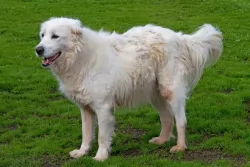 Abruzzenhund was established as an individual breed in the middle of the 20th century. They are descendant of the big, white Eastern sheepdogs which came to Europe 2000 years ago. Abruzzenhund is a mix of Turkish sheepdogs Akbash and Karabash, the Kuvac, Slovakian breed Hungarian breed, Komondor, and a French sheepdog Pyrenean Mountain Dog. Those dogs were much bigger than today’s breed. Abruzzenhund is still not very popular breed, but it is very common in Great Britain and Italy. They have been used as guard dogs, hunting dogs, and working dogs because they are very brave and strong.
Abruzzenhund was established as an individual breed in the middle of the 20th century. They are descendant of the big, white Eastern sheepdogs which came to Europe 2000 years ago. Abruzzenhund is a mix of Turkish sheepdogs Akbash and Karabash, the Kuvac, Slovakian breed Hungarian breed, Komondor, and a French sheepdog Pyrenean Mountain Dog. Those dogs were much bigger than today’s breed. Abruzzenhund is still not very popular breed, but it is very common in Great Britain and Italy. They have been used as guard dogs, hunting dogs, and working dogs because they are very brave and strong.
 The Jagdterrier is a tenacious hunter, taking on lots of wild creatures such as boars, badgers and even cougars.
The Jagdterrier is a tenacious hunter, taking on lots of wild creatures such as boars, badgers and even cougars.
He is of medium size standing between 33 and 40cm in height and weighing 7-10kg.
He has a coat of black and tan which can also be a dark brown shade or be a charcoal color. The Deutscher Jagdterrier is a compact, well-proportioned dog with a wedge shaped head and flat skull. The ears are set high and go up before they come down to form floppy ears. The tail has always been docked at about one third of the tail. These days it is often left long, being carried raised.
Active, athletic and alert, the Jagdterrier is also social, intelligent, strong-willed and confident. He is a serious hunter but can make an excellent pet, especially when trained and socialized.
He is energetic so he will require owners who are prepared to include him in all their activities. They are good around children, but their hunting side makes them long to be outdoors busy with exciting activities.
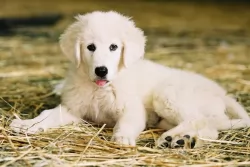 A height of Abruzzenhund variates between 60-73 cm, males are slightly bigger than females. While the weight is 30-45kg, again, males are heavier than females.
A height of Abruzzenhund variates between 60-73 cm, males are slightly bigger than females. While the weight is 30-45kg, again, males are heavier than females.
Abruzzenhund lifespan is between 11-13 years, but since these dogs don’t have any weaknesses and don’t tend to get sick, they can live longer with a proper care and adequate food and training.
Litter size of Abruzzenhund depends, but as any large breed, they usually have 6-9 puppies. And that is a very good considering size of the breed.
Abruzzenhund is not the only name of this breed. There are more names that you might hear. You can hear names like Maremma, Pastore, Abruzzese, Cane da Pastore, Maremmano- Abruzzese, Italian Sheepdog, and many similar names. Basically, they sound similar but there are differences.
Abruzzenhund is a friendly dog, but it is very powerful. Very strong jaw with a scissors bite makes them very strong. They have small but intelligent eyes, usually dark colored. The undercoat is dense, while the coat is white with segments of ivory to white yellow. Their long undercoat and coat make them winter resistant.
 Your Deutscher Jagdterrier is an intelligent dog who enjoys the company of his human family, particularly when they are active and can meet his high energy needs and his desire to be busy.
Your Deutscher Jagdterrier is an intelligent dog who enjoys the company of his human family, particularly when they are active and can meet his high energy needs and his desire to be busy.
They are quite wary with strangers and this makes them alert watchdogs. They are affectionate and playful with children if the children know how to respect them. Because of their hunting skills, they can be a bit of a threat around small animals in the home.
He is a quick learner and responds well to training and socialization. He will thrive on living in the countryside, but wherever you live with your Jagdterrier, give him plenty of exercise, a warm, dry bed, good food and your love and devotion, and he'll respond by being a super pet and companion.
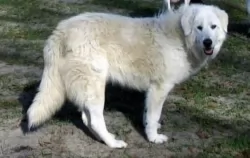 Abruzzenhund is a very well-balanced breed who loves spending time with other animals and people. They have a very good temper. They love being around families, and they are very gentle with children. It is important to train Abruzzenhund properly because the dog of that size should be a leader. A human with a strong character should train this breed. Training is important because they tend to make their own decisions which can be bad sometimes.
Abruzzenhund is a very well-balanced breed who loves spending time with other animals and people. They have a very good temper. They love being around families, and they are very gentle with children. It is important to train Abruzzenhund properly because the dog of that size should be a leader. A human with a strong character should train this breed. Training is important because they tend to make their own decisions which can be bad sometimes.
 You’re not going to be taking a sick Jagdterrier to the vet often as this is generally a healthy dog breed who can reach 13, 14 or 15 years of age with good care.
You’re not going to be taking a sick Jagdterrier to the vet often as this is generally a healthy dog breed who can reach 13, 14 or 15 years of age with good care.
He may be prone to a genetic breed disorder known as Primary Lens Luxation. Sometimes people are given prescription eye drops to constrict the pupil ad help the subluxated lens from getting worse.
This is a painful hereditary condition that leads to blindness. It affects many breeds of dog, particularly terrier-type dogs.
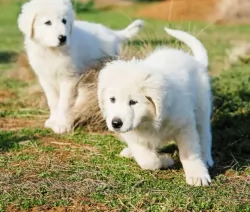 A great thing about Abruzzenhund is that they are very healthy dogs. They don’t have any chronical health problems, so if you are feeding your dog properly, with a lot of exercises they will not have any health problems. It is also important to check genetics of the dog.
A great thing about Abruzzenhund is that they are very healthy dogs. They don’t have any chronical health problems, so if you are feeding your dog properly, with a lot of exercises they will not have any health problems. It is also important to check genetics of the dog.
 Your energetic Jagdterrier will do well on a high-quality dog food, of which there are some good ones on the market.
Your energetic Jagdterrier will do well on a high-quality dog food, of which there are some good ones on the market.
If you do buy a commercially manufactured dog food, make sure that you read the instructions on the packaging so as to adhere to portion control. You can’t afford to have your pet becoming obese as this opens up a host of problems, and it can also shorten your dog’s life-span.
If you invest in high quality kibble, try to add in some nutritious and tasty home-made food such as cooked chicken, some brown rice or pasta and some vegetables. It is always wise to add in some raw meat from time to time as this promotes good health in your dog and prevents skin allergies.
Any diet for a dog should be in keeping with his age and his energy levels. Make sure your pet has constant access to fresh, cool drinking water.
Brush your Jagdterrier’s hair twice a week. It will keep the coat in tip top condition, but it also does your pet the world of good. He loves it when you take time out to be with him and to give him some special time. Brushing him also allows you to check him over for ticks and fleas.
Other grooming aspects for your dog will be to check on his nails and to clip them when they get too long. Ears should also be checked regularly to avoid a buildup of wax and dirt and teeth should be checked as well. Dental disease can lead to a host of illnesses which can be detrimental to the heart and kidneys.
Every dog needs different forms of exercise to remain lean and healthy. Options for exercise for your Jagdterrier can be going on walks, swimming and play time in the backyard.
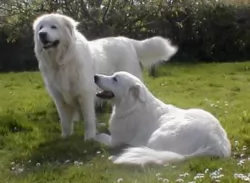 They learn very quickly, but it requires strong will and constant training to keep them happy. They are great working dogs, and with the positive training, they are amazing. It is very important that they follow rules and to keep them in balance with training.
They learn very quickly, but it requires strong will and constant training to keep them happy. They are great working dogs, and with the positive training, they are amazing. It is very important that they follow rules and to keep them in balance with training.
They can eat a lot of food, depend on their activity. High-Quality dog food twice a day for a grown dog is a must. While puppies should eat 3-5 times, smaller portions of food. The food is important especially for working dogs, they need up to 2000-3000Kcal per day. Abruzzenhund will enjoy eating meat with a lot of vegetables and oil.
They are not recommended for small house or apartment. They need big yard because they require a lot of space. During the winter they can be outside because of their coat, but during the summer they need to be in the shade with a lot of fresh water available anytime.
The coat should be brushed and groomed very often because they have a thick coat. There is a lot of dead and loose hair in it. During shedding, period takes even more time to groom your dog properly. They love and they need exercise. Mental exercise is important as physical. Every day walking, running, playing with other animals is an important part of dog's activity. When they get enough quality exercise, they will sleep in the house.